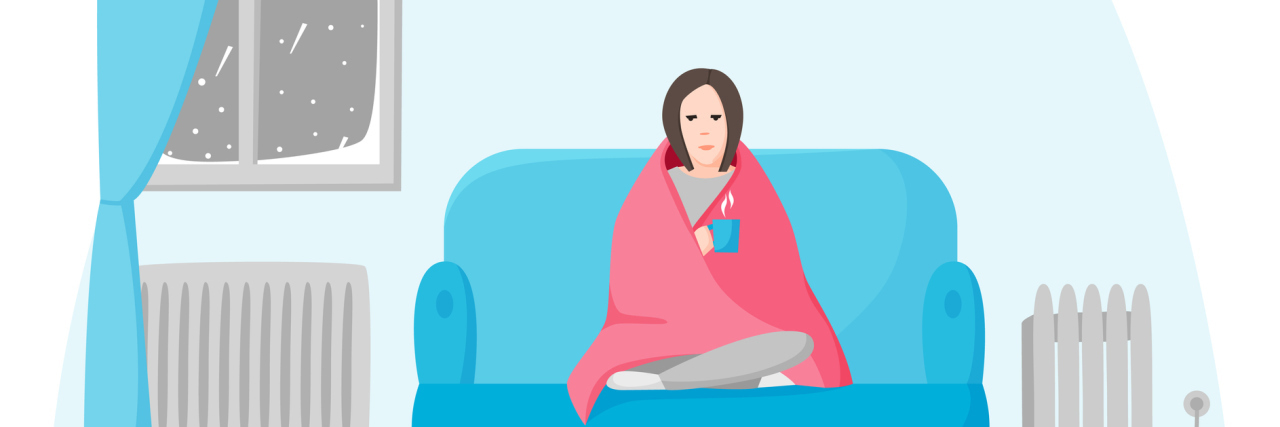Everyday problems turn into disasters when you’re chronically ill and have no support system.
- What is Fibromyalgia?
- What Are Common Fibromyalgia Symptoms?
Living in the Northeast, you expect significant snowfall at times during the winter. Having grown up in that part of the county, I was accustomed to this seasonal annoyance. It was only after becoming ill I realized how I had taken for granted my ability to handle the requirements of functioning throughout a snowy winter. After one particular snowfall, I realized just how challenging living alone with a chronic illness had become.
As my illness had progressed, figuring out how to accomplish daily living activities, such as taking out the garbage, became a weekly project. When the weather turned cold, the projects became more daunting. I’d watch the weather forecast with dread, knowing if it snowed enough, I’d be trapped inside my house for days, unable to shovel myself out. Perhaps I could swing one expensive grocery delivery, but my mental health would struggle, being trapped in my small apartment and eventually, I would have to leave the house. I had a long hilly walk up a driveway to get to where my vehicle was parked. I’d buy ice melt in small quantities that I could carry and sprinkle down the driveway as I held the side of the house with my other hand for balance. After one snowfall, I made it up the driveway to my car only to see it was covered in more snow than my wipers or my body could handle removing.
Occasionally, I had asked an acquaintance for help shoveling enough snow so I could pull my car out. However, I was becoming extremely uncomfortable asking for help from virtual strangers. Especially when what I needed help with wasn’t that much. The snow on my car this time was not overwhelming, not much more than a five-minute job for someone in good health. However, it felt so hard having someone come all the way over for five minutes, while I stood there and watched, looking like an able-bodied person on the outside, but my body unable to handle simple tasks on the inside.
With little family or friends, I felt truly helpless. It was the ultimate frustration — being only 40 years old, of sharp mind, but unable to leave the house because of some snow on my car. I spent a day calling around to every local social agency, but there were no services to help the disabled with snow removal, unless maybe, you were a senior. I didn’t have any neighbors to ask for help as well-meaning people who didn’t have a chronic illness suggested I do. No one could really understand just how it felt to be stuck.
I called snow removal companies as a last resort. They could not remove snow from my car due to insurance restrictions. So, I took to Facebook, contacting ads posted by strangers to do snow removal. Random folks looking to make extra cash. I felt desperate as I talked to shady people trying to charge me $50 just to remove snow from my car, even after I had mentioned I was disabled. Another insisted on knowing my address before they would even talk about prices, which further creeped me out. Others said they would be right over and never showed up.
I sat in my apartment drained from crying, feeling empty, as if the loneliness I was living in was a hollowness inside me. I couldn’t shake the feeling my life was so precarious. That just surviving was taking up what was becoming entire days. Figuring out how I’d carry groceries into my apartment with minimal pain repercussions. The next week’s trash day always in the back of my mind. How’d I’d be able to get the laundry done. Phone call after phone call to qualify for programs, get through to doctors and get prescriptions refilled. If your entire existence is just about surviving, what was the point? There was no joy, no comfort, no soothing words coming from anyone. Just me, a list of things to get done and time.
I felt left for dead. I put out a desperate cry for help on Facebook and received no response. The realization no one I knew could take five minutes to help me felt as painful as if everyone I knew had come and stabbed me in the back with a literal knife. The salt in the wound was when hardly anyone even offered a word of support or an inquiry, wondering if I was still trapped. What was I going to do as my illness progressed? What would I do if something really bad happened, if a disease like cancer struck? The answer was I would be handling it absolutely alone, emotionally and physically.
This wasn’t about the logistics of getting tasks accomplished, it was about the pain of being totally abandoned by society. With nothing left to do, I just wrote it all down. Really just for something to do. It didn’t bring me comfort to bring life to my pain. For me, no catharsis comes from expression, it just makes it all the more real.
Getty image by vkulieva

